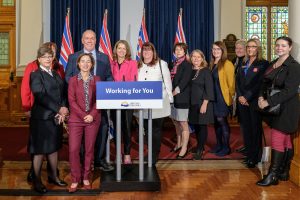
Housing project is the first step in a larger housing plan
By Naomi Ambrose, Staff Writer
In a recent press release from the Office of the British Columbia Premier, it was announced that 280 homes are scheduled to be built in BC for women and children who are escaping violent situations.
The release also indicated that the housing project is the “first major investment in transition housing in more than two decades.” The houses will be built in 12 phases throughout British Columbia. The project is also part of a larger initiative undertaken by the BC government.
According to the release, the houses “are the first step in the government’s new Building BC: Women’s Transition Housing Fund. The [fund] was launched in the 2018 budget as part of the Province’s 30-point housing plan.” The fund is a $734 million investment with at least a 10-year duration that will facilitate the construction of “1,500 transition housing, second-stage housing and affordable housing spaces for women and children fleeing violence.”
The release also elaborated on the operational aspects of the housing project. Providers in the non-profit sector that are involved in housing support for at-risk women and children will be in charge of the housing. The housing project will also involve the creation of new, affordable rental housing for more permanent accommodations.
The press release included insights from Joanne Baker, executive director of the BC Society of Transition Houses.
“Fleeing violence often results in poverty and homelessness for women and their children if they can’t access safe, secure housing,” she said. “The reality or risk of homelessness frequently results in women returning to violence. The investment in affordable housing through the Women’s Transition Housing Fund that is dedicated to women and children escaping violence is crucial.”
the release did not specify how long the women and children can stay in the houses, the new houses may help to provide additional housing to balance transition houses that usually have a limit on the duration of a stay. According to information retrieved from the website of the Ending Violence Association of BC, many transition houses only allow people to stay for up to 30 days.
The Association’s site also elaborates on the difference between transition housing and second stage housing. The former offers temporary, 24-hour shelter free of cost to those in need. The latter can house women and their children for up to 18 months to help those fleeing abuse plan and prepare for their futures.
BC Housing’s website also contained information about transition housing. The transition houses are staffed and are usually residential houses. These communal houses are in private, secure locations, staffed by support workers who provide a variety of guidance and emotional support.
The BC government’s press release did not state when construction is scheduled to begin or when the houses will be opened.


